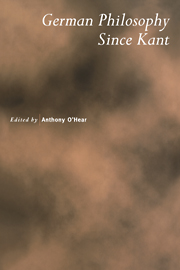Book contents
- Frontmatter
- Contents
- Preface
- Notes on Contributors
- Fichte and Schelling
- Hegel's Critique of Foundationalism in the ‘Doctrine of Essence’
- Schopenhauer's Pessimism
- Karl Marx
- Nietzsche's Virtues: A Personal Inquiry
- Bolzano, Brentano and Meinong: Three Austrian Realists
- Vorsprung durch Logik: The German Analytic Tradition
- German Philosophy of Mathematics from Gauss to Hilbert
- The Revolution of Moore and Russell: A Very British Coup?
- Husserl's Concept of Being: From Phenomenology to Metaphysics
- Frege and the Later Wittgenstein
- Otto Neurath, the Vienna Circle and the Austrian Tradition
- Does the Nothing Noth?
- Reactionary Modernism
- Adorno on Disenchantment: The Scepticism of Enlightened Reason
- Habermas, Science and Modernity
- German Philosophy Today: Between Idealism, Romanticism, and Pragmatism
- The Career of Aesthetics in German Thinking
- Hermeneutic and Analytic Philosophy. Two Complementary Versions of the Linguistic Turn?
- Index of Names
The Career of Aesthetics in German Thinking
Published online by Cambridge University Press: 29 September 2009
- Frontmatter
- Contents
- Preface
- Notes on Contributors
- Fichte and Schelling
- Hegel's Critique of Foundationalism in the ‘Doctrine of Essence’
- Schopenhauer's Pessimism
- Karl Marx
- Nietzsche's Virtues: A Personal Inquiry
- Bolzano, Brentano and Meinong: Three Austrian Realists
- Vorsprung durch Logik: The German Analytic Tradition
- German Philosophy of Mathematics from Gauss to Hilbert
- The Revolution of Moore and Russell: A Very British Coup?
- Husserl's Concept of Being: From Phenomenology to Metaphysics
- Frege and the Later Wittgenstein
- Otto Neurath, the Vienna Circle and the Austrian Tradition
- Does the Nothing Noth?
- Reactionary Modernism
- Adorno on Disenchantment: The Scepticism of Enlightened Reason
- Habermas, Science and Modernity
- German Philosophy Today: Between Idealism, Romanticism, and Pragmatism
- The Career of Aesthetics in German Thinking
- Hermeneutic and Analytic Philosophy. Two Complementary Versions of the Linguistic Turn?
- Index of Names
Summary
In German philosophy of the last 250 years, aesthetics has played a leading part. Any arbitrary list of great names contains mainly authors who either have written classical texts on aesthetics or are strongly influenced by aesthetic reflection, for instance, Kant, Hegel, Schelling, Schopenhauer, Marx, Nietzsche, Dilthey, Heidegger, Wittgenstein, Gadamer, and Adorno – the few exceptions being Husserl and Frege. It is not by chance that Frege is one of the founding fathers of modern Anglo-Saxon philosophy, where, generally speaking, aesthetics has had only marginal influence. That is not an insignificant difference. The wildest dreams of one tradition were focused on logic, those of the other on aesthetics.
At any rate, the hopes placed by German thinking in aesthetics were enormous. Aesthetics was to be at times the better ethics, at other times the better epistemology, and at still other times simply the best philosophy. Since Kant's days, however, sceptical voices have been heard repeatedly that have wanted to transfer aesthetics back to the modest state of a subdiscipline; but they have not succeeded in doing so. Aesthetics up until today continues to be one of the great temptations of German philosophy (and not solely of German philosophy, if we think of the later Michel Foucault or the later Nelson Goodman).
- Type
- Chapter
- Information
- German Philosophy since Kant , pp. 399 - 412Publisher: Cambridge University PressPrint publication year: 1999
- 1
- Cited by

